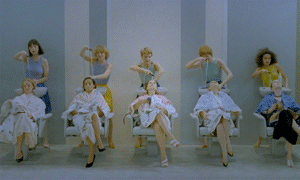This Week You Will Be a Better:
- streamer
- feminist
- body double
- parent
- unpopular rock song
No improvement needed for our contributor scb0212 this week. Send articles throughout the week to ploughmanplods [at] gmail, post articles from the past week below for discussion, and Have a Happy Friday!
At Soaring Twenties, Independent filmmaker “D.B.” goes long on the circumstances that actor and writers strikes are pushing back against – and offers some alternatives to the streaming models that have no profits for creatives:
I’d like a BandCamp for filmmakers. Technically videos can be uploaded to BandCamp too, but the only real issue there is that people go to BandCamp for browse music, not movies. Having a FilmCamp offshoot, either as a part of BandCamp’s platform or as a unique company, would be stellar. Since video takes far more bandwidth than music, it would be understandable for the film specific platform to charge more like 30% on purchases, which is what the consignment rate for self-published work at Hastings used to be. […] When it comes down to it, it’s not true that “They don’t make good movies anymore.” The history of film has always contained an underlying three-way tug-of-war between studios trying to shore up costs and risks, against artists trying to express themselves while make a living, against audiences seeking novel, quality entertainment. A very quick rule of thumb though is that if something is cheap and convenient, it probably pulls the rope away from the artists. For a while the audience may feel they’re winning too, but if the artists fall, the audiences will start losing too.
For Los Angeles Review of Books, Lori Marso talks about the feminism of Barbie including a comparison to the work of Chantel Akerman:
[Greta Gerwig] cites Jacques Demy’s 1964 musical Umbrellas of Cherbourg’s intense color palette, but might just as well have called our attention to feminist auteur Chantal Akerman’s 1986 Window Shopping (released outside the United States as Golden Eighties). Akerman’s 1970s films mostly complied with film critic and director Laura Mulvey’s 1975 insight that breaking the male gaze in film requires feminist filmmakers to produce avant-garde work that remaps and even destroys visual and narrative pleasure. Akerman’s static camera, long takes, and durational gaze mandating that viewers “feel time passing” are the opposite of entertaining and distracting, instead forcing viewers to sit with uncomfortable feelings. But Window Shopping is different. Akerman, a Barbie who always refused a box (Akerman did not like the labels “feminist” or “queer” as descriptors of her films, even though they were often both), uses Window Shopping to experiment and reinvent the musical in a highly formalized vein. Akerman’s typical focus on framing and everyday gesture remains, but it is awash in the colors and visual pleasure exuded by Technicolor MGM musicals of the 1940s and ’50s.
The ups and very low downs of Ivy Snitzer, Gwenyth Paltrow’s body double in Shallow Hal as reported by Amelia Tait in The Guardian:
“It was so exciting. It was just fun to be part of a movie – there are so few people who actually get to do that,” she says. The cast and crew “treated me like I really mattered, like they couldn’t make the movie without me” and Snitzer was made to “feel really comfortable” when her body was being filmed. Black, she says, was “a delightful person” and Paltrow was “really nice” (she regularly complimented Snitzer’s acting). It didn’t cross her mind to be offended by the film’s jokes about her size because she made those kinds of jokes, too. But, she says, “it didn’t occur to me that the film would be seen by millions of people”. And when Shallow Hal was released in 2001, “it was like the worst parts about being fat were magnified. And no one was telling me I was funny.”
Emily St. James writes about the difficulty of watching bad things happen to fictional kids now that she’s a parent:
I still don’t always feel like a parent. The trick of all of this is that you can’t see your child all of the time, and when you’re not looking at them, you start to think that maybe they’re not actually real. The first few weeks the baby was at home, I would wake up from a dead sleep and listen to the sound of their breathing in the night, just to assure myself that they were alive, yes, but also that they existed. Maybe that’s all parenting is – a long series of tricks you play on yourself to remember that one of the most important people you will ever, ever know is fundamentally a mystery to you, somewhere in the dark, breathing, making a sound, but having their own life that will extend beyond yours, maybe forever.
Rolling Stone‘s Andy Green looks at the least-streamed songs by Spotify’s most-streamed artists:
U2: ‘Is That All?’ (884,258 plays) – Why It’s Here: U2 recorded 1981’s October under less than ideal circumstances. They were burned out after spending massive amounts of time on the road promoting Boy, under immense pressure to cut a successful follow-up, and struggling to come up with lyrics since Bono lost his notebook shortly before recording started. They were also torn in two since Bono, the Edge, and Larry Mullen Jr. had become part of an evangelical Christian group that Adam Clayton had no desire to join. The result was a compromised album of spiritual songs that largely didn’t connect with a mass audience. It ends with “Is That All?,” which showcases what happens when your lead singer loses his lyrics right before recording starts. “Oh, to sing this song makes me happy,” he sings. “I’m not happy with you/Oh, to sing this song makes me dance.” He then repeats “Is that all?” over and over. By this point in the tracklist, judging by the paltry number of Spotify spins, many fans have given up on the album.


